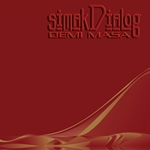Home » Jazz Articles » Album Review » simakDialog: Demi Masa
simakDialog: Demi Masa
Arshad's adventurous, exploratory structures obviously come from the jazz-rock fusion perspective. But what distinguishes Arshad's sound is his powerful but subtle use of ancient Indonesian music, primarily temple ritual music and the percussive heart of traditional Indonesian gamelan ensembles. Here's why it works: The repetitive, circling nature of traditional Indonesian chants and instrumental drones play like rhythmic loops that can literally go on forever, which makes them very attractive rhythm tracks for jazz-rock keyboard and guitar players who like to take extended solos.
It's really much simpler than that. A friend boils it down to "Return to Forever with tablas," which is a bit "too" simplistic but provides a great definition for jumping into the opening "Forever Part One" and "Part Two." Tohpathy's rhythm guitar chops out sharp chunks of melody, which subsequent solos set a jazz-rock fire. Arshad sounds like Keith Jarrett stirring the pot of Miles Davis's Bitches Brew, especially when he keeps spiraling out the same riff over and over—the sound of a musician with his eyes closed, lost in the outward sound of his inward muse—while multiple percussionist busily keep its polyrhythmic beats. There's something conceptually charming about the far-ranging and visionary song called "Forever" that can captivate attention for twenty minutes.
Arshad's keyboards also reflect the brilliance of electric keyboard masters from Brazil, Antonio Carlos Jobim and Eumir Deodato, in "Tak Jauh Kedua (Not So Far) Part Two." "Karuhun (To Elders)" draws strong ties back to Chick Corea's Spanish dancing, especially Arshad's acoustic piano solo, which bounces like a jazz leprechaun on top of its beyond-jazz accompaniment.
The uplifting finale "Disapih (Separate Away)" gloriously culminates all these colorful threads and patterns, the final destination on Arshad's and Tohpati's fantastic voyage.
Track Listing
Salilana Pertama (Forever, Part 1); Salilana Kedua (Forever, Part 2); Tak Jauh Pertama (Not So Far, Part 1); Tak Jauh Kedua (Not So Far, Part 2); Trah Lor - Laras (Northern People - Voices); Trah Lor -Rupa (Northern People - Faces); Trah Lor - Tapak (Northern People - Prints); Karuhun (To Elders); Disapih (Separate Away).
Personnel
Riza Arshad: Fender Rhodes electric piano, Yamaha acoustic grand piano, Oberheim OBX analog synth; Tohpati: electric and acoustic guitar; Adhithya Pratama: bass guitar; Endang Ramdan: lead Sundanese kendang percussion, tambourine, claps, toys, vocals; Erlan Suwardana: Sundanese kendang percussion, claps, toys, vocals; Emy Tata: Sundanese kendang percussion, claps and vocals (2); Mian Tiara: vocals (7); Dave Lumenta: soundscapes (8).
Album information
Title: Demi Masa | Year Released: 2009 | Record Label: Moonjune Records
< Previous
Pieces of Old Sky
Next >
Lines of Influence
Comments
Tags
For the Love of Jazz
 All About Jazz has been a pillar of jazz since 1995, championing it as an art form and, more importantly, supporting the musicians who create it. Our enduring commitment has made "AAJ" one of the most culturally important websites of its kind, read by hundreds of thousands of fans, musicians and industry figures every month.
All About Jazz has been a pillar of jazz since 1995, championing it as an art form and, more importantly, supporting the musicians who create it. Our enduring commitment has made "AAJ" one of the most culturally important websites of its kind, read by hundreds of thousands of fans, musicians and industry figures every month.




















